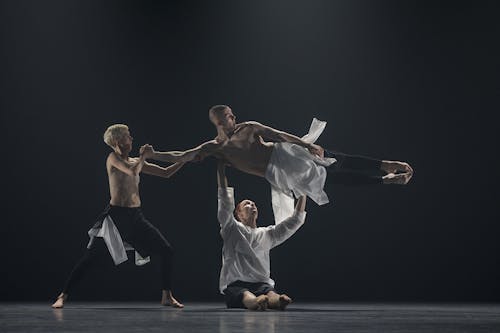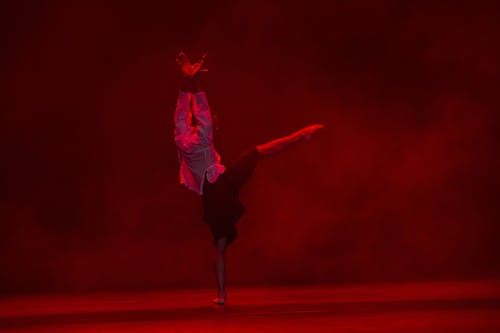Clean, Precise and Unpredictable: Jlin and the art of movement
Interview
In the run-up to her Rewire 2019 performance with Company Wayne McGregor, we spoke to Jlin about ‘Autobiography Edits’, Staging Sound and her groundbreaking collaboration in dance.
“I feel like movement has a sound,” Jerrilynn Patton, better known as Jlin, begins to explain over Skype. “In the same way that people hear colours, for me, movement has a sound.” Her interpretations of this is what she expresses through her music. The American musician has carved out a space for herself in today’s art world, one that’s not necessarily left behind, but proudly moved beyond the categories of club, footwork and electronics she was once being attached to. Within her work, there has always been the connected thread of movement, however haphazardly it’s been stitched. One of her latest collaborative projects brought her together with British award-winning choreographer Wayne McGregor on ‘Autobiography’, an expressive portrait illuminated by the sequencing of his own genome that Jlin in turn soundtracked.
Jlin’s own interest in movement didn’t arrive in any formative way. Her first memories of dancing are with her parents, coming home after church, “playing old records and dancing around – but not in a serious way, just us enjoying ourselves.” But dance is not the only thing that comes to mind when we talk about sound and movement. To Jlin, the way someone blinks their eyes or gestures with their hands, these idiosyncratic movements are not only mesmerising but also revealing and worth studying, and when I ask what she has in mind when creating, she admits she’s just as likely to be thinking of a fight scene as of a dance one. “I feel like dancing and fighting are the exact same thing, I think they coincide,” both a sequence of movements.
We talk of the music video for “Unknown Tongues” off of her 2015 record Dark Energy in which we encounter dancer Lilian Steiner. “Her movement is so abstract, like nothing I had ever seen before, and she does not do what you would expect. She’s moving in a way that her personality does not match – and I love that!” Jlin is often seeking this distance and unfamiliarity. It feeds into CPU – clean, precise and unpredictable – “a rule of mine,” which has been evolving in tandem with her artistic output. It’s these elements she strives for in her own work but is also looking out for when working alongside others.

“When I met Wayne [McGregor], I could instantly feel his spirit and his vibe was right. He doesn’t follow the rules, which is something I love about him because neither do I.” McGregor, who also falls under the CPU guidelines, shares interests that revolve around the ‘technology of the body’ and through his work we find him constantly seeking new ways of physical thinking, communicating ideas through the body to audiences. Talking about their recent joint endeavour – Jlin writing the score for McGregor’s dance performance Autobiography – she expands on the topic of collaboration to explain that a certain level of mutual respect and friendship has to be met before the work can even begin. “The closeness comes first. It’s not the art, there has to be a connection before we can create. My personal comes before my solo work.”
→ https://www.youtube.com/embed/l6XOwb_uPUk
This prerequisite of closeness and friendship arises from the fact that the process of creation is an extremely vulnerable one for Jlin. “I create from the core of myself – I create from a space of vulnerability. My phrase ‘creating from the belly of the beast’ is often misinterpreted as a demonic statement, but it’s not, it’s having to create from a place that’s not complacent.” It ties in with another mantra that Jlin holds close, the need to reflect the times and stay true to herself, something borrowed from classical pianist Nina Simone – an artist Jlin refers to as an elder, an ancestor. Through this she strives to create something authentic and meaningful, connecting the dots instead of only making your head bop, as she puts it.
This intimacy in her own work means it’s crucial to have trust and respect with those she’s collaborating with. “Before putting so much of myself into it, I need to know someone else is submitting the same,” Jlin acknowledges. The collaboration with McGregor felt just like that, giving Jlin the space and acknowledgement she needed to respect her own work: “there was something about Wayne allowing me to display that side of myself and trusting me that allowed me to trust myself too.” In working with McGregor, she went through a process of change, she changed the way she approaches writing a piece. She describes it as a more considerate approach that involves important conversations in the beginning, making sure everyone involved is on the same page not only regarding the project but also on a personal level: “if we start together, we’ll end together.”
“Another thing I learnt was to listen more – listen to my instincts.” No matter how successful one may be, Jlin argues, everyone experiences doubt and pressure from society, from their peers, it’s inescapable. A big learning experience was to acknowledge self-doubt as intrinsic to the process and share her output with her trusted collaborator regardless. “When I created the first overture I had never let people listen to pieces like that before,” McGregor would send key words to Jlin; sadness, energy, vulnerability, doubt. This was the starting point for ‘Abyss Of Doubt’ featuring in ‘Autobiography’; “no out, no out, no matter what I do I cannot get out of this state of mind.”

There’s also been a change in physical self perception: recognising the musician as a body. “I detox to keep myself clean when I am creating, no sugar, no alcohol. I don’t need supplements to create, I am that thing, I don’t need to be enhanced by anything.” In keeping with that, she shifted her sleeping pattern so she could work from 2am to 6pm and also went vegan, which, she says, “gave me such clarity and focus to feel and sense things. I took that on as a method for when I am writing now.”
Ultimately, Jlin’s reflections on her writing, the process of collaboration and her fascination with movement tie in naturally with McGregor’s ‘Autobiography’. More than just a novel way of relating to choreography – the dance movements were computer generated from the sequencing of McGregor’s genome – Jlin relates the piece to human behaviour. After all, “human behaviour is the way we move through the world.”
Jlin and the dancers of Company Wayne McGregor perform ‘Autobiography Edits’ at Koninklijke Schouwburg on Friday, 29 March. Learn more at.
Words by Jo Kalinowski, photos by Alicia Clarke, Andrej Uspenski and Richard Davies.